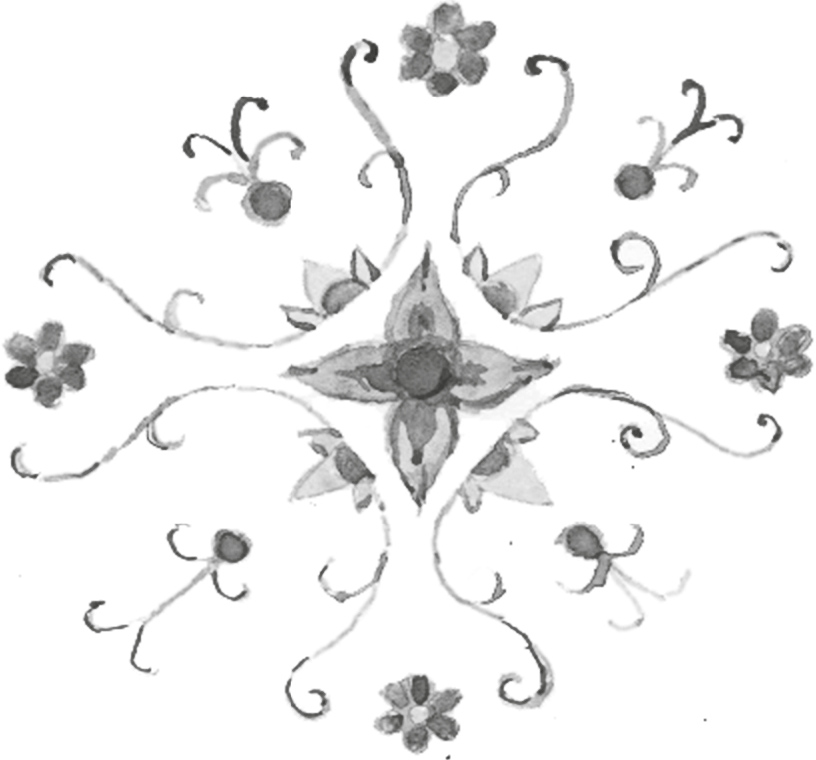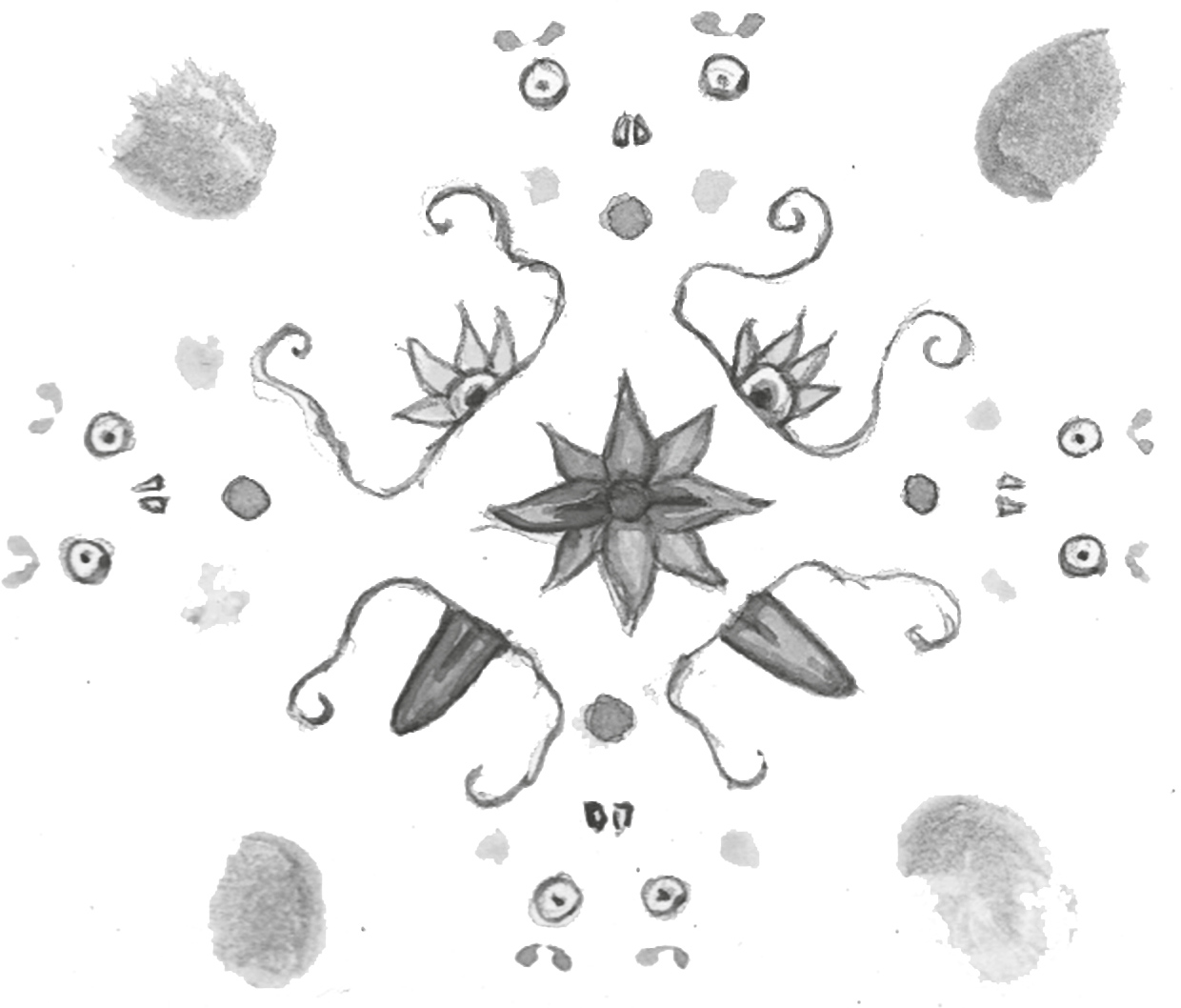3.
New things are delivered to me here every day through the mouth of the great fish. Mostly I have in the post: shells and fish and sea-meat of every kind. And amidst it all, from time to time, come other small things that tell of humankind. Little shards of smoothed glass, or even, now and then, O wonder, small pieces of broken porcelain that the great beast has bothered up from the ocean floor.
But not yet my child, not all of these todays.
Still, the shark looks for him, I feel certain of it. What other purpose for this great monster?
For example, it sometimes—rare times, but still—delivers me wood. This is close to him, not yet him but getting warmer. Wood! Hallo, you were a tree! I call, I was once a human. I have been wave-battered and sea-scrubbed, sea-weeded, salted, dripped and dropped and pickled here, but once, I cannot quite say how long ago, but yes indeed I was once . . . a fellow.
I feel such sympathy, now, for ships in bottles. I know you, my friends. I do live your story. What horror, the cork going in. It is very thin air inside, is it not? Oh my darlings, would that I could pull out the stoppers and see you all float free. What an armada!
As long as I have light, I have life. When the last candle is gone, the last match struck, then am I in misery locked. For there is no light from the gill shutters of this shark, or at least none that reaches me here. Nor do I have, as the Pantheon of Rome boasts, a blowhole in my roof. How nice that should be—news from above! But the darkness is, I am afraid, total. How I feel the dark. In the darkness there is just my heartbeat, no other trace of me. I know now that I can put it out, but not forever. What then?
Ever since losing my Pino I have begun to look differently at objects. Wondering if they have life, too. At times, these days, I feel more at ease with a fishing net than I might be with a fisherman. That I might be companion more to tin than to tinsmith. That I would be closer to needle than to needlewoman. Have I been demoted? Do I yet count?
Am I growing wiser, I wonder, as I am being punished?
Sometimes, as I drift off to sleep in the dark, my own father comes back to me. Babbo. I am not frightened of him any longer. Sometimes in this watery tomb I hear him sighing. He is put off by me, I know. Irked that I am here when I should not be. No, no, he would be distressed. He would cry, I know, to see me come so old, so white.
My own dear Babbo was all Industry. I, his boy, was entirely Idleness. Our family business was painting upon pottery: We provided decoration for plates, for oil jugs, for pots and cups and what have you. It was family tradition, the painting of this on that. In my childhood, his factory was the most famous business in all Collodi. At one time employing a full thirty people.
The paints were always the same, the pattern ever identical. It was the family pattern, you see, it was our birthright. And, from my earliest scrawling, I too was directed to practice this same pattern upon paper—always and only this pattern—until I had proven my manhood by mastering it. On the day when I had at last got it down, and only then, I would come into my own. Yet I never could quite perfect it. It taunted me in my sleep, this design, tried to etch its curves onto my skin, to tattoo me with itself. How that pattern persecuted me. It was the family fortune. I must draw it every day.
Each morning, Father would look over my shoulder to inspect my painting. Five times through the course of the day, at the very least, he returned to look again. And every time he would render the same verdict:
“No. No. Not yet. Look again.”
Or, “It is not right.”
Sometimes, even, “You do this, I am sure, to insult me.”
But I never got it right. Some children are given lines to write out (I am a willful and ignorant child, one thousand times), but my endless punishment was that pottery pattern. Beautiful, you may say, as many do, but to me it was murder. No other creation but this, no other colors or lines or curves or bursts, until it did me over. I could not devote myself to the same four-petaled central flower, to the smaller five-petaled flowers that framed it, to the meaningless lines between them. This same design repeated again and again, as if it were the only choice. But every day burnt sienna, straw yellow, violet, and burgundy. I yearned for turquoise, the pattern not containing any; I called for cobalt; in my sleep I screamed out periwinkle! And when I dared to draw or paint something other, my father would find it out (he had such a nose for it!), rip it up, and shine his anger upon me.
“Cruel!” I would be called.
Sometimes, even, “False child.”
All this because I could not learn the family language.
I was very good at school, top of my class in Collodi. I did not mess about like my friend Antonio and the other boys; rather I liked the books, liked to get lost in them. The teacher even ventured that one day I might go to university.
My father said no I would not. All the learning I needed was at home, in the pattern.
This is what my family looked like, a portrait of a people:

Actually, that is not bad at all! Father, Father, do but look. What say you?
I can almost hear him: My boy, my only boy! Look how you keep the family. So proud, boy!
But no, he did not say that, not ever.
It was my great-great-grandfather Giambattista who started this curse, he who founded our family business, once Collodi’s most prosperous. It was he who devised that pattern, one so striking, so beautiful, so perfect that to paint any other was to shame the family. It was what we were known for. All we ever were.
Were Father to have gone blind, I think it would have been of no great matter; he surely could have painted the pattern, so well did it fit him, without requiring his eyes. His apprentice boys managed to pick it up in a few months. But I, who had spent so many years at it, never could. Father, though he loved me, loved me a little less because of it. Indeed, I think he struggled over what was the point of me. There was only one labor, for this family, for this town.
And yet, as I grew up, I started whittling—started making my many woodthings. In private I found this other way of communicating. I had a simple penknife, and as I walked the woods around Collodi, I took a dead branch from an old oak and made a little face in it. That was how it started. I brought the little work home.
Father greeted it as a crooked thing for me to have done. To him it smelled of betrayal. But I could not stop myself. I carved little things in wood, strange faces, odd creatures, letting the wood guide me. And then, when I returned to the painting of pottery, my whittling thoughts came along with me. I took the pattern of my family’s fortune and changed it; I pushed the pattern, pulled it, stretched it. I let the brush guide me. Sometimes I feared that I had broken it altogether.

If here I seem to exaggerate—and I confess that I do, somewhat—it was as if I had made such a mess.
“Why, why, why must you?” called my babbo. “Oh, my God, how have I upset you so that you send me this doltish donkey for a progeny? You mock me, my boy. You mock kith and kin, you mock bread and wine, mock father, mock love.”
“No, Babbo! No, sir. No, truly.”
“Yes, boy, you do.”
“I do not mean—”
“Then paint the pattern as it has always been.”
“Now, Babbo?”
“This very instant.”
I picked up a plate and did what I could. He took it from me and broke it, Father did, as if he were terrified that someone might witness our family come to ruin.
Father, O Babbo, please forgive?
I seem to hear him now, here in the whale: “My son, my only son, do not let the pattern die. The pattern. Oh, the pattern!”
Father, I have a son of my own now, or had. A little wooden life.
Father, O my babbo, do but look at me now. Your Geppetto.





